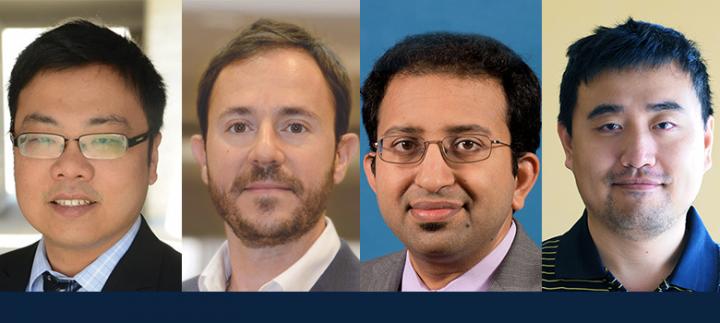
Credit: The University of Texas at San Antonio
(San Antonio, April 16, 2019) – Four University of Texas at San Antonio (UTSA) researchers have each been awarded a National Science Foundation (NSF) Faculty Early Career Development (CAREER) Award, totaling $2 million in new research funding for San Antonio’s largest public research university. CAREER Awards, one of the NSF’s most prestigious programs, helps UTSA advance closer to National Research University Fund (NRUF) eligibility.
UTSA’s 2019 CAREER Award recipients include:
- Bing Dong, assistant professor, mechanical engineering
- Nikolaos Gatsis, assistant professor, electrical and computer engineering
- Teja Guda, assistant professor, biomedical engineering
- Xiaoyin Wang, assistant professor, computer science
To earn NRUF eligibility, UTSA must meet qualitative and quantitative targets such as restricted research expenditures, the quality of an institution’s faculty and its annual rate of doctoral degrees awarded. To evaluate the quality of an institution’s faculty for NRUF eligibility, Texas considers only the most prestigious professional achievements. NSF CAREER Awards are among those highly recognized honors.
“Through our various research excellence initiatives, the research culture on campus is evolving. The NSF Early CAREER award is a success marker in the research world, and is an amazing accomplishment by our esteemed faculty members. Their achievement elevates and promotes the quality of our faculty and the research conducted at UTSA to prospective students and peers alike,” said Bernard Arulanandam, UTSA interim vice president for research, economic development, and knowledge enterprise.
Dong’s NSF CAREER Award of $500,181 will support his project, “Holistic Assessment of the Impacts of Connected Buildings and People on Community Energy Planning and Management.” The funding will allow Dong to develop a new method of energy planning and management for smart communities and cities.
“This CAREER award will help me achieve my long-term career goal of advancing interdisciplinary research on sustainable and smart cities, where smart communities, people, grid, transportation, water systems and others interplay and to make a real world impact on energy efficiency and environmental sustainability,” said Dong.
Gatsis will further his research on electricity distribution networks and water distribution systems as part of his project, “Optimal Interdependent Operation of Electricity Distribution Grids and Water Distribution Systems in Smart Cities.” His $500,000 CAREER award will support the development of more reliable and cost-effective electricity and water delivery.
“It’s an honor to receive this award,” said Gatsis. “It will enable me to explore an exciting and timely research direction. This project also supports education through enhancement of the power engineering curriculum at UTSA.”
Guda was awarded $530,688 for his project, “Programming Vascularization by Design in Porous Composites,” which will generate new discoveries about how blood vessels grow.
“What we learn about how these vessels grow will allow us to design new biomaterials solutions for tissue engineering and regenerative medicine,” said Guda. “Understanding the underlying science could also potentially help us understand what goes wrong with vessel formation during cancer, when competent, structured networks of vessels are not formed.”
Wang will use his $492,358 CAREER award to develop techniques for better detection and repair of software bugs in his project, “Analysis and Repair of Build Scripts for DevOps Software Practice.” His research interests include enhancing software productivity and quality using more robust software build systems.
“By reducing the bugs in software build systems, my research will lead to more timely software release and software products of higher quality, which will benefit people who directly use or are involved in activities supported by the software,” said Wang.
###
The NSF CAREER Award supports early-career faculty who have the potential to serve as academic role models in research and education and to lead advances in the mission of their department or organization. Unlike most research grants, this award requires both strong scholarly research and a significant plan for education and mentorship.
Eleven UTSA faculty have won CAREER Awards over the last five years.
Media Contact
Courtney Clevenger
[email protected]
Original Source
https:/




